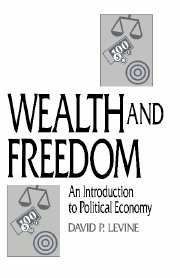12 - International society
Published online by Cambridge University Press: 20 March 2010
Summary
Obligations to others
When the global economy becomes the setting for pursuit of our private ends, the world of private affairs takes on boundaries different from those of public authority and responsibility. In the older language I allude to in the introduction to this book, the boundaries of civil society extend beyond those of the state. The modern world has moved rapidly in the direction of a global economy and global society. But the legal jurisdiction of the state remains geographically limited. This lack of concurrence between state and society poses an important problem (see Keohane and Nye 1977).
If there is no authority to regulate international conduct, does this make the world order a system of anarchy? Does the anarchic aspect of the global system discourage states and citizens from pursuing ends other than those rooted in their self-interest?
Those who study the political dimension of the international system emphasize dilemmas that arise due to its anarchic structure (Bull 1977). States exist and interact without any higher authority to enforce rules and patterns of conduct. Some argue that anarchy encourages each state to pursue its particular interests – in national wealth, power, and security (Waltz 1979). Whatever ties develop between states and between their citizens do so to serve self-regarding ends. Each state calculates its interest and takes those actions vis-à-vis other states most likely to achieve that interest.
- Type
- Chapter
- Information
- Wealth and FreedomAn Introduction to Political Economy, pp. 152 - 160Publisher: Cambridge University PressPrint publication year: 1995



